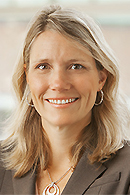
 Jill Poole, MD, always enjoyed the science of immunology and how it intersects with airway diseases. That interest led her to clinical and research fellowships at National Jewish Health and eventually to establish an academic allergy and immunology program at the University of Nebraska Medical Center.
Jill Poole, MD, always enjoyed the science of immunology and how it intersects with airway diseases. That interest led her to clinical and research fellowships at National Jewish Health and eventually to establish an academic allergy and immunology program at the University of Nebraska Medical Center.
With her dual interests in immunology and airway disorders, Dr. Poole’s mentor strongly recommended that she pursue a fellowship at National Jewish Health.
“It was the best place to train in the country,” Dr. Poole said. Today, Dr. Poole is one of more than 700 former National Jewish Health fellows practicing worldwide.
She was an allergy and immunology fellow at National Jewish Health from 2002 to 2004, working with numerous leaders in the field including Drs. Harold Nelson, Richard Weber and Lanny Rosenwasser. She stayed an additional year for a research fellowship, where Dr. Donald Leung was a strong mentor.
“Being in a day hospital was highly instructional,” she said. “It was a unique training opportunity to watch patients on a daily basis and see a wide range of diseases and pathology. There are also a lot of research opportunities, ranging from basic science to epidemiology.”
When Dr. Poole completed her fellowship, she returned to her home state of Nebraska to become the only academic allergist on staff at the University of Nebraska Medical Center.
“I started an academic allergy and immunology program based entirely on what I learned at National Jewish Health,” she said.
In her clinical practice, she primarily sees adults with conditions ranging from severe asthma to vocal cord dysfunction to chronic hives.
She has an active lab and is leading a National Institutes of Health-funded study on agriculture-induced lung diseases. She is applying her expertise in immunology to look at the airway immune response to organic dust from contained agricultural settings such as feed lots and dairy barns.
Dr. Poole encourages fellows to take full advantage of opportunities at National Jewish Health. “It is a unique experience,” she said. “Seek out and talk to different investigators to see how you can work with them, and work really hard to see as much as you can.”